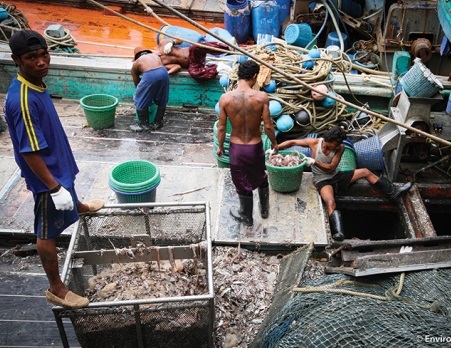 Source: New Internationalist
Source: New Internationalist
The 14 Burmese men cramped in a small room in a police station in Kantang, southern Thailand, are tired, scared and disorientated. Each of them came to the country to find work and improve the lives of their families.
A broker had promised them employment in factories with good conditions but instead they were sold onto fishing vessels and into six months of unpaid, dangerous work at sea, under a brutal regime of 20-hour days and casual violence.
Some of the men saw seven ‘unco-operative’ workers murdered by the brokers who controlled them. One had weights tied around his neck before being thrown into a river while the others were forced to watch.
As local police look on, a bruised worker explains to me how he and his friend made a run for safety on arriving in port, but they were caught, locked back in a room with the other men, and beaten unconscious: ‘After three nights, we were told that one of us would be executed. We had to draw lots to see who would be killed. If the police had come one hour later, we would have been killed already.’
The men were able to finally reach safety by selling dried squid to buy a mobile phone from another fishing boat. They contacted relatives who alerted a helpline, leading to their rescue by police.
As we close the door to onlookers in the police station, the men become more candid and tell us their broker is allied with local police and forced them to work on a rubber plantation owned by a police official, and to paint cells at the station. They tell us the translator they were offered was their broker’s wife and that his other associates are given free access to speak to them.
While we are at the station, the boat owner himself arrives and, as the brother of the town’s mayor, is greeted warmly by senior officials before giving cigarettes, soft drinks and food to the trafficking victims. When they are due to appear in court there are more attempts to buy their silence, with $300 offered if they don’t disclose the owner’s identity, his company, or the name of the boats.
All the workers refused the bribe but the legal case could take over a year and no legal representation has been offered. The men are restless to return to Burma or find work, rather than wait to appear as witnesses in a protracted legal case. Like so many trafficking cases in Thailand, this one looks unlikely to result in prosecutions or justice for the victims.
Sadly, cases like this are common. At the Environmental Justice Foundation (EJF), we have published a report called ‘Sold to the Sea’ which exposes severe human rights abuses associated with human trafficking in Thailand’s fishing industry.
Multiple reports in recent years have documented abuses of trafficked boat workers in Thailand, bonded labour, excessive hours, withheld pay, threatened violence, physical abuse and murder. ‘Sold to the Sea’ documents the testimonies of Burmese workers as young as 16.
The severity of abuse is also not unprecedented. A UN survey found 59 per cent of interviewed migrants trafficked aboard Thai fishing boats reported witnessing the murder of a fellow worker.
Back in Kantang, we walk through the freezing processing factory where the workers were held on their return to port. The wooden double-decker fishing vessels they worked on are moored nearby. The neatly packed boxes are destined for export as Surimi – a paste used to make fish or crab sticks. Another part of the catch is ‘trash fish’ – a messy sludge of marine life destined for processing into fishmeal for one of Thailand’s thousands of shrimp farms.
The stark truth is that the plight of these men is part of an international supply chain, in a sector that too often lacks basic transparency, traceability and accountability. This lack of oversight not only facilitates human rights abuses, it allows boats to operate illegally – stealing fish from neighbouring countries’ waters and using banned fishing equipment.
It’s never been more important for governments, the seafood industry and international agencies to come together to rid fisheries of human trafficking and exploitation. The lives of tens of thousands of trafficked fisherfolk in Southeast Asia, and around the world, depend on it.
The full ‘Sold to the Sea’ report, detailing EJF’s investigation in Thailand, and a powerful short film, are available at the EJF website.
